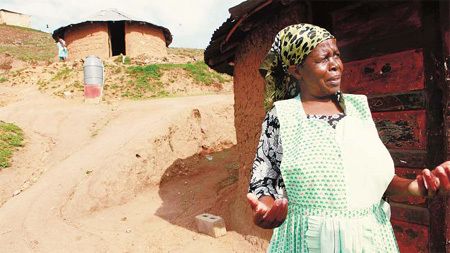|
|
南非推广干厕 政府花钱买尿(图)南非港口城市德班为了鼓励民众使用节水干厕,推出了花钱收购民众尿液的创举。为了改善卫生状况,同时节省开支,该市此前已在居民的花园中安装了9万个不需冲水的干厕,但是很多民众拒绝使用,有人甚至将干厕拆除或用于存放杂物。鉴于此,德班市决定选择500个居民干厕安装容积为20升的容器收集尿液(因其富含硝酸盐、磷和钾,可以转化为肥料),工作人员会每周上门收取,并支付该户居民4美元作为报酬。南非有43%的家庭每天的生活费不到2美元,每周 4美元的收入不算是个小数目,政府希望经济方面的刺激能够让更多的居民开始使用干厕。  南非推广干厕 政府花钱买尿
Mtanzi, who uses one of the many dry toilets with a urine separation unit, is pictured in Umzinyathi, some 56 km south of Durban, South Africa on Oct 21. (Agencies) Get paid to pee. That's the deal on offer in the South African city of Durban, where the city is looking to buy liquid waste to encourage residents to use dry toilets。 Aiming to improve hygiene and save money, the port city has installed in home gardens about 90,000 toilets that don't use a single drop of water。 Now Durban wants to install 20-liter containers on 500 of the toilets to capture urine - rich in nitrates, phosphorus and potassium, which can be turned into fertilizer。 A municipal worker would collect the jerry cans once a week and could pay around 30 rands ($4) to the family - not a small sum in a country where 43 percent of the population lives on less than $2 a day。 Currently the tanks are emptied by each household, and the waste often ends up getting dumped into the environment。 Swiss lab Eawag and the Bill and Melinda Gates Foundation are backing a study to draw up the modalities for the scheme, which is already winning fans。 "If we can turn the toilets into a source of revenues, then they will want to use the toilets," said Neil MacLeod, Durban's head of water and sanitation。 Most people are reluctant to use the dry toilets. In the sprawling township of Inanda, residents have ripped doors and roofs off the outhouses, annexed them to the main house or completely stripped them away。 Discussing bodily fluids is so taboo that people are reluctant to explain their discomfort. One young mother accused thieves of stealing "the door and the toilet" from her outhouse, which she now uses as a garage。 "When the (city) council brings the toilets to them, they look at it as an inferior system," said Lucky Sibiya, an outreach officer with the water department。 "People don't understand how important it is," he said. "There is a belief saying that touching the faeces brings misfortune." As soon as they can afford it, people invest in a septic tank and abandon the dry toilets, which require spreading a layer of sand after each use and using separate sections for the urine and the solid waste. The tanks then must be emptied regularly。 Dry toilets were invented in Yemen centuries ago。 "They work well in rural areas because the fertilizer produced from the urine and the faeces is used locally," said Pierre-Yves Oger, a water and sanitation consultant based in South Africa。 "But in urban areas, there's a dissociation between the producer (of the waste) and the user of the recycled products, and it's very hard to overcome the psychological block," he said。 That's why few cities have launched large-scale dry toilet projects. Durban began its program in 2002 when a cholera outbreak revealed the lack of hygiene in a city where more than a quarter of the 4 million residents have no sanitation。 To avoid having to install an entire sanitation system, and to save water, Durban opted for dry toilets. The city remains convinced that was the right choice。 "South Africa is a water-stressed country," said Teddy Gounden, who heads the project. "With the increase in demand for drinking water, we cannot afford to flush this valuable resource down the sewer." 网友评论
企业服务 |


